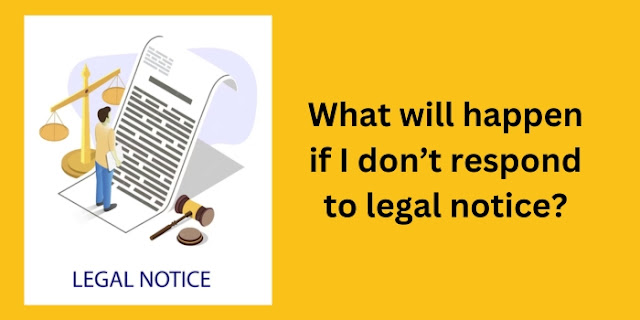What Will Happen If I Don't Respond To Legal Notice?
In the complex realm of legal matters, receiving a legal notice can be a daunting experience. Whether it's a dispute, a contractual issue, or any other legal concern, addressing the matter in a timely and strategic manner is crucial. Failure to respond to a legal notice can have serious repercussions, potentially exacerbating the situation and leading to unfavorable outcomes.
Default Judgment and Its Ramifications
Ignoring a legal notice may result in the opposing party seeking a default judgment. A default judgment occurs when the recipient fails to respond within the specified timeframe. This judgment is typically in favor of the party initiating the legal action, and it can have severe consequences. It may involve financial penalties, asset seizures, or other legal remedies, depending on the nature of the dispute.
Escalation of Legal Proceedings
By not responding to a legal notice, you risk the escalation of legal proceedings. This means the opposing party may initiate a lawsuit or take further legal action against you. This can result in increased legal expenses, prolonged litigation, and potential damage to your reputation. It's essential to understand that non-response does not make the issue disappear; instead, it may exacerbate the situation, making resolution more challenging.
Adverse Impact on Your Credit and Finances
Ignoring a legal notice can also have implications for your financial well-being. If the dispute involves financial matters, such as debt collection or contractual obligations, non-compliance could lead to damage to your credit score. This, in turn, may affect your ability to secure loans, mortgages, or other financial arrangements in the future. Proactively addressing legal issues is crucial to mitigating financial risks.
Also Read - Is it mandatory to send legal notice through lawyer?
Enforcement Actions and Seizure of Assets
In some cases, a failure to respond may prompt the opposing party to seek enforcement of the judgment. This could involve seizing assets or garnishing wages to satisfy the legal obligations determined by the court. To safeguard your interests, it is imperative to engage with the legal process, either by negotiating a resolution or presenting a defense, rather than allowing matters to progress uncontested.
Legal Precedents and Future Implications
By not responding to a legal notice, you risk establishing a legal precedent that may work against you in future disputes. Courts may consider your non-response as an admission of guilt or liability. This could significantly impact your ability to defend yourself in subsequent legal matters. It is in your best interest to consult with legal professionals to assess the potential long-term consequences of non-compliance.
Preserving Your Rights and Defenses
Responding to a legal notice is not merely a formality; it is an opportunity to assert your rights and present a strong defense. Failing to respond means forfeiting the chance to challenge the claims made against you, potentially leading to a less favorable outcome. Take the initiative to consult with legal counsel to explore your options, build a solid defense, and protect your rights.
Conclusion:
In the intricate landscape of legal disputes, ignoring a legal notice is not a viable strategy. The consequences of non-response extend beyond immediate financial and legal implications; they can have lasting effects on your reputation and future legal standing. Proactive engagement, consultation with legal professionals, and a strategic response are paramount to safeguarding your interests and navigating the complexities of legal proceedings successfully.



